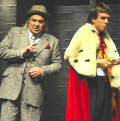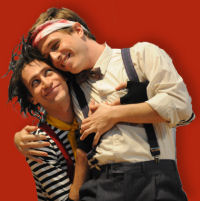
The play takes off from ancient myths—Oedipus, Persephone, and other primal stories of parents, children, and death—but them leaves them far behind. Except for his finely-tuned Hebrew language, Aloni (one of Israel’s leading playwrights and translators of plays, who died in 1998) removes his story entirely from the Israeli context that hangs so heavily over so many of this country’s original works of drama. The action takes place in an unnamed South American country and the two main characters are the deposed king of a Central European principality and his wayward 20-something son. The Khan’s Arie Tcherner and Udi Rotschild offer flawless performances in this sonata for two actors, under the fine direction of Udi Ben Moshe.






